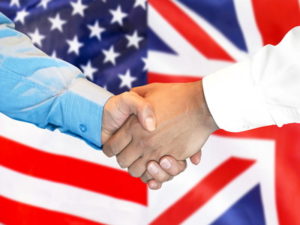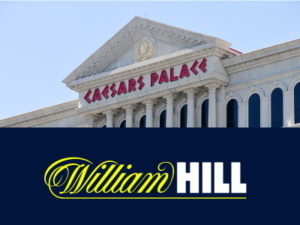The US Takeover of UK Betting and Gambling Giants
 The United Kingdom has a rich history when it comes to gambling. Today, betting and gaming is a much more liberal affair in the UK compared with many other countries, including the United States of America.
The United Kingdom has a rich history when it comes to gambling. Today, betting and gaming is a much more liberal affair in the UK compared with many other countries, including the United States of America.
In comparison, due to years of regulation that made gambling largely illegal, especially online, the USA is only just waking up to the fact that the online betting industry can provide a high level of income for both companies and country. Meanwhile, the UK government has been acquiring royalties in the form of taxes from its casino, sports betting, poker, bingo and other legal sectors for many years now.
Naturally, the US has taken notice of this, and in recent years has promptly started to take action towards its own legitimate gambling scene. The question is, how long will it be before the US looks to takeover the whole of the UK (and potentially a large portion of the European) betting market? With multiple US states introducing legal sports betting opportunities since the overturning of the PASPA law in 2018, could their attention be turned to expanding across the remainder of the US and into other areas of the world?
UK companies are attractive to US companies looking to enter the online space simply due to the decades of experience these brands have. They also have sophisticated proven software and platforms as well as in depth statistics of what works and what doesn’t when it comes to attracting customers to bet. The negative side is these US companies are not really interested in the ‘old-world’ businesses and many could sell-off, split up or close down UK betting shops and websites.
William Hill Takeover
 For anyone living in the United Kingdom, William Hill will be a well-known betting company name. Its retail outlets have flooded the high streets of the country for many years, and it’s one of the oldest brands to still exist. Once the US sports betting market began to open up though, it didn’t take William Hill long to try and insert itself into the scene. And that led to some other interesting developments for the gambling company.
For anyone living in the United Kingdom, William Hill will be a well-known betting company name. Its retail outlets have flooded the high streets of the country for many years, and it’s one of the oldest brands to still exist. Once the US sports betting market began to open up though, it didn’t take William Hill long to try and insert itself into the scene. And that led to some other interesting developments for the gambling company.
At the end of September 2020, an announcement was made that stated William Hill had agreed to a £2.9 billion takeover from the US casino operator Caesars Entertainment. The deal saw both companies state that Caesars would pay £2.72 per William Hill share in cash, a premium of more than a quarter when compared with the price of such prior to the interest by the US brand. That deal needed to be approved by at least 75% of William Hill shareholders, and after being recommended by the UK company’s directors, it was.
Two rival bids by the US private equity group Apollo were declined by William Hill before the deal could be reached with Caesars. And with that takeover, Caesars gains access to the burgeoning sports betting market within the United States. Of course, during the current status of the worldwide pandemic, online sports betting in the USA has provided many betting companies with a necessary lifeline.
The value of shares in Caesars surged from a minor $6 during the March crisis to a wonderful $54 on the same week of the takeover announcement. And it was at this point that Caesars mentioned that the William Hill takeover could help it to bring between $600 million and $700 million in revenues through 2021.
Almost immediately following the takeover Ceasar’s suggested that they may seek to offload the UK and European arms of the business. This could mean William Hill could disappear from UK high streets in the way we know it today and is one of the big issues facing the UK gambling industry.
It’s not just this takeover that has been in the pipeline, though. It seems as though UK betting firms are in high demand with US companies. But why is this? What exactly do they gain from acquiring such companies? And why are these betting firms so open to being taken over considering their long history of activity within the UK and European markets?
Reaction of UK Firms to the Overturning of PASPA Law
 The owner of Ladbrokes, Entain has also found itself at the centre of a takeover bidding war, as the US casino giant known as MGM resorts has sought to acquire Entain. With its own attempt to jump into the UK sector, MGM proposed an £8.09 billion takeover, although that was quite swiftly turned down by Entain.
The owner of Ladbrokes, Entain has also found itself at the centre of a takeover bidding war, as the US casino giant known as MGM resorts has sought to acquire Entain. With its own attempt to jump into the UK sector, MGM proposed an £8.09 billion takeover, although that was quite swiftly turned down by Entain.
Had it taken the offer though, it would likely have helped MGM to rapidly expand its own sports betting sector. Obviously, the US sports betting industry has been growing at quite a considerable rate since the PASPA law became null and void. And in fact, experts have predicted that the US sports betting market will surpass the UK one by 2023 if things carry on in this way. Of course, if the US companies are swallowing up the UK betting firms, this isn’t so difficult to believe in the end.
Once the PASPA law was overturned in the United States, UK betting companies were swift to take action. William Hill already entered the US market in 2011 when it acquired three betting firms, which allowed it to grow in the Nevada sports betting sector. Nevada and a couple of other states were exempt from the PASPA legislation due to the fact that they already had sports betting laws in place prior to its introduction. William Hill then expanded its business even further in 2018, securing a 20% investment from Caesars for its US operations.
Entain, which previously went by the name of GVC Holdings, started out in 2018 with licences in three US states, and then with the change in law by the Supreme Court, it was also able to expand its business there. A number of partnership contracts were then set up with US casinos, racecourses and gaming estsablishments. As part of one deal, Entain were able to supply technology to all of MGM’s casinos.
Plus, the owner of UK company that owns Paddy Power and Betfair, Flutter Entertainment, runs its own selection of betting partnerships with US brands. In fact, it re-branded itself to Flutter Entertainment a while back in order to enter the US market. Its Fox Bet platform, for example, is run alongside a major company. It was only in December of 2020 that Flutter agreed to a £3.1 billion deal, which would see it take control of 95% of the US-based daily fantasy sports and online betting company FanDuel.
What Makes UK Firms So Appealing to the US?
 MGM and Caesars are two huge US companies that have both taken an interest in the UK market. Their ambitions are to expand their own online sports betting markets as quickly as possible. MGM for example invested $1 billion into its own digital operations in 2020.
MGM and Caesars are two huge US companies that have both taken an interest in the UK market. Their ambitions are to expand their own online sports betting markets as quickly as possible. MGM for example invested $1 billion into its own digital operations in 2020.
Due to the fact that the UK has experienced much more liberal gambling laws throughout the years, it has managed to create a mature online gambling market in various sectors. The past decade has seen it go through considerable growth and heightened popularity, which has placed these UK firms at the very forefront of technological developments.
When the PASPA law was overturned in 2018, US firms struck deals with UK companies, so that they could quickly access their technology and provide sports betting options to players within the US. Obviously, the impact of the coronavirus pandemic on UK stock prices has provided quite the exceptional opportunity for these big US companies to put in huge takeover bids.
One investment director for AJ Bell, Russ Mould commented on the situation of takeover bids currently occurring. He said that there is clear evidence behind the MGM and Caesars takeover bids that show they are quite desperate to add to their own online footprint at the moment. The pandemic is “undermining business” in their US resorts and casinos, so in a bid to build their standing up online, they’re looking to acquire the rights to the technology possessed by brands like William Hill and Entain. This way, they can easily incorporate the online sports betting technology into their own offerings and garner the projected profit from it.
What About the Land-Based Shops of UK Firms?
 The fact that so many US companies are trying to takeover big UK firms for their online services has left many people to wonder what will happen to the retail outlets of these companies. After all, it’s not uncommon for residents of the United Kingdom to walk down the high street and see numerous betting shops on the way. However, it doesn’t seem like these particular betting outlets are of any interest to the giant US companies.
The fact that so many US companies are trying to takeover big UK firms for their online services has left many people to wonder what will happen to the retail outlets of these companies. After all, it’s not uncommon for residents of the United Kingdom to walk down the high street and see numerous betting shops on the way. However, it doesn’t seem like these particular betting outlets are of any interest to the giant US companies.
When Caesars agreed to the £2.9 billion takeover of William Hill, it pretty much hinted strongly at the fact that it intends to sell all of the betting shops. Caesars stated that it has the intention of finding alternative owners for the non-US part of the business, and this should be implemented in the short-term following the completion of the company acquisition. With this being the case, it’s likely that should any other takeovers be completed, the same outcome will be experienced at retail shops.
Does this mean that brands like Ladbrokes, Coral, Paddy Power and William Hill will no longer be seen on the high streets? Some people have complained about the distinct presence of these betting establishments and commented on them being too many. Perhaps if anymore US acquisitions are experienced, the UK high streets won’t suffer under them as much. That would mean a severe cutting of many peoples’ jobs, though.
Online sports betting in the United Kingdom is expected to remain fully active through William Hill and any other brands that accept a takeover deal from a US company. Little should change for fans of this particular style of gambling. However, when it comes to the offline scene, things could become a little harsher. If the retail stores are sold off and potentially shut down altogether, not only will employees of such locations lose their jobs, but some people will lose their chance to participate in sports betting in the UK.
It’s a known fact that there is a generation of people who still have a preference for going to physical betting shops to place their sports bets. This doesn’t only provide them with a route towards placing bets though, but a social aspect of their lives. Within such places, punters get the chance to converse with other gamblers, have a chat with the employees taking their bets and so on. It’s an opportunity to get out of the house. So, it could be quite the massive blow to those employed by the brands in their retail stores, as well as the people who visit them to place bets.
Obstacles Remain in Place for the US Companies
 While it’s true that the biggest obstacle for US companies to expand in the sports betting sector disappeared with the overturning of the PASPA law in 2018, minor issues still remain. These are present on a state-by-state basis, as each different location has its own rules and laws surrounding sports betting, and can introduce new legislation if they choose to make it a legal activity within, too.
While it’s true that the biggest obstacle for US companies to expand in the sports betting sector disappeared with the overturning of the PASPA law in 2018, minor issues still remain. These are present on a state-by-state basis, as each different location has its own rules and laws surrounding sports betting, and can introduce new legislation if they choose to make it a legal activity within, too.
If you were to look at North Carolina as an example, one part of the state’s sports betting laws requires players to place their wagers in person. This means that they must visit specific locations within the state to make a bet on their favoured sporting event. Therefore, the growth of online betting is very limited within.
Or what about the state of Virginia, for example? While online sports betting has been made a legal activity within, it isn’t permitted to take place on college sports or any events involving youths. These particular factors remain a challenge that US betting firms are trying to overcome, and if they can do so by expanding into the UK scene and acquiring companies, then they will.
As of the moment, there are just three US states where sports betting is not allowed in any shape, way or form. Utah has been an anti-gambling locale ever since it was written into the state constitution that gambling is illegal in any form. Meanwhile, Idaho and Wisconsin haven’t publicly announced any bills that would legalise sports betting within their borders.
One thing remains the case, though – the United Kingdom sports betting scene has a lot that it can offer to the burgeoning US market. And the American firms know this, too. Is it possible that the entirety of the UK betting industry could find itself owned by US companies? And if that does occur, is it possible that European companies will be moved on to afterwards? Only time will tell on both fronts.



